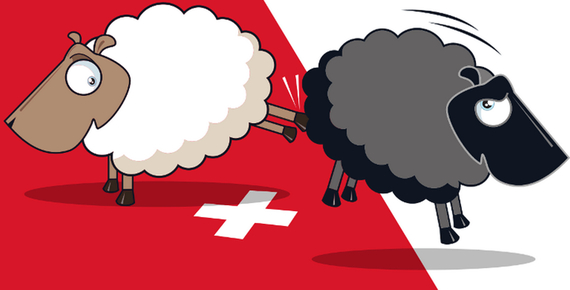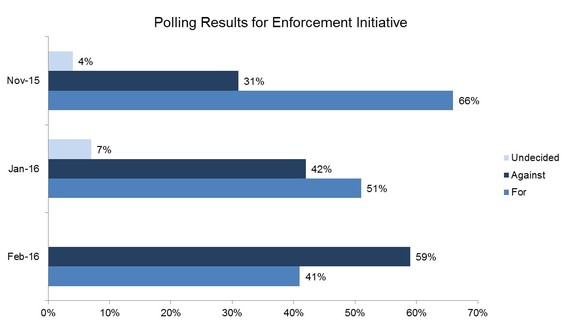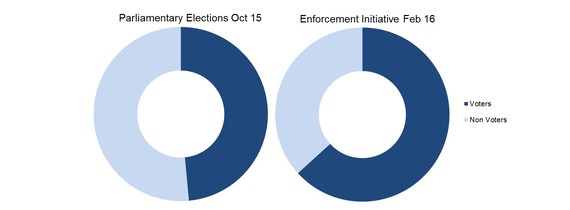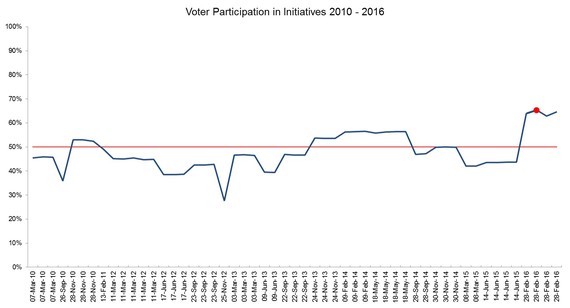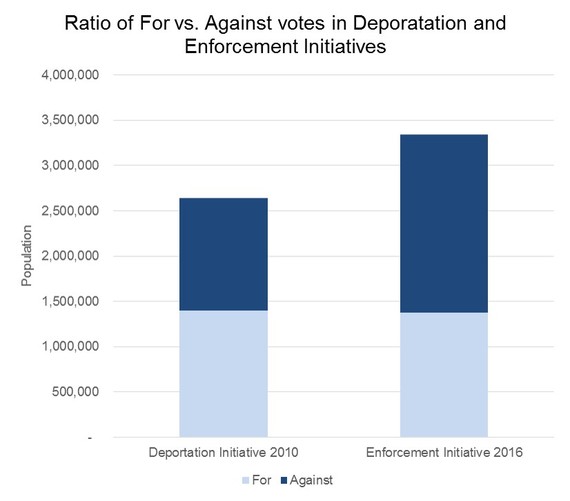A Disturbing Trend
Eight years after the financial crisis, Europe has steered steadily towards the right of its political spectrum. This seemingly silent, rather stealthy shift, is one narrated by populism and nationalism, veiled in xenophobia.
In May of last year, the United Kingdom saw Nigel Farrage's UKIP gain 4 million votes campaigning on a Brexit, immigration caps, and a 40% increase in defence spending. Marine Le Pen's Front National harnessed seven million votes in France straddling a similar rhetoric. With Geert Wilders's Partie voor Vrijheid (Party for Freedom) leading popular polls by describing Europe's refugee crisis as an "Islamic invasion", the political climate in Europe looked rather dim towards the end of 2015. It then came as no surprise when in October 2015, Switzerland voted in a majority ring-wing parliament into power. The Schweizerische Volkspartei (SVP/Swiss People's Party), won 29.4% of the parliamentary seats. Infamous for their controversial depictions of foreigners as black sheep, the SVP had their largest victory ever.
This displacement to the right is no random event. Studying the period between 1870 and 2014, the Centre for Economic Studies in Munich finds that right-wing parties increase their share of the vote after a major financial crisis on average by 30%. Blaming foreigners and minorities for the times and turmoil faced by the majority is compelling polemic in such periods.
Emboldened by their electoral success in autumn last year, the SVP were looking to pass the Durchsetzungsinitiative (DSI/Enforcement Initiative) towards the end of February in 2016. The initiative sought to deport foreigners who commit crimes. It is the second of its kind. The Ausschaffungsinitiative (ASI/Deportation Initiative) accepted in 2010 already ensures deportation of foreigners convicted of egregious crimes such as murder and sexual violence. The DSI sought to take this further and expel all who commit even two minor offences in a span of 10 years, such as speeding or disorderly conduct; judges would be stripped of their responsibility in considering individual circumstances of the case and any potential human rights violations as a result of deportation.
The passing of such an initiative strikes at the very heart of the rule of law. In addition to being unconstitutional by applying different sets of law to different people, the DSI would coerce a fourth Swiss population, its two million foreign residents, to live in a constant state of vigilance, descending a nation proud in its democracy into an apartheid-like state of affairs.
In studies conducted soon after national elections in October, 66% of those polled were in favour of the DSI with 31% against. In the middle of January 2016 these figures had narrowed to 51% for and 42% against. On the 28th of February, the day the initiative was brought to vote, it failed 59% against to 41% for.
A Numbers Game
In a span of 3 months, what appeared to be a sure win for the populist movement, fell flat. The glaringly obvious reason as to why it failed, is simply that more people voted.
- More people voted in this initiative than in the national elections, four months prior. 64% of eligible voters voted, compared to the 48% who voted in the parliamentary elections. Translating into about 780,000 more votes.
The Winds of Change
There occurred a mass mobilisation of votes, not across a particular cross-section of voters but rather across the entire spectrum. Behind this call to arms was Operation Libero. Founded in early 2014, Libero spearheaded the campaign against the Enforcement Initiative since autumn 2015 through to its victorious finish. Hannes Grassegger of Das Magazin does meticulous justice in telling their story.
Dominik Elser, co-president of Operation Libero and Ph.D. candidate at the University of Bern, profiles three defining features in Libero's campaign, which potentially contributed to the increase in voter participation.
Trolling Trolls
Social media is plagued in hordes by trolls, cyber warriors arguing for the sake of argument, insistent on having the last word in a comment thread. Right-wing commenters on newspaper articles and Facebook media pages wield power over journalists writing the articles as well as influencing the silent majority of the readership. Libero dedicated a team of men and women charged with battling such comments in order to voice the opposition.
"Don't feed the Troll" is common internet wisdom in not encouraging extremist dialogue. Ignoring this advice, Libero actively pursued them, and in doing so created visibility not just for themselves, but also for the inaudible voices of the opposition that were drowned in the comments sections.
Yelling "Fire"
Apathy was rampant in the opposition after their defeat in the October elections. Policy makers were willing to let the Enforcement Initiative slide as a win for the right-wing SVP, and were more concerned in applying resources to a subsequent initiative in which Switzerland debates national law against international law.
Operation Libero was one of the few highlighting the gravity of the initiative at hand. The impending threat that the Enforcement Initiative placed on Switzerland's constitution, and on its ability to govern fairly. By being incredibly vocal on social media platforms, placing advertising boards and placards across the country, and open sourcing the distribution of its flyers (mailing them to whoever asked), it generated momentum and shifted much-needed attention onto the Enforcement Initiative.
Rewriting the Mythos
The prevailing narrative ahead of Libero's entrance, was that the SVP were at best conservatives, protecting Switzerland from the actions of criminal foreigners. Branding the SVP radicals, Libero championed human rights. A right to life, to liberty, and to the pursuit of happiness, ideals on which they claim Switzerland was founded. Ideals on which it should be governed, and ideals that would be trampled upon, should the populist initiative have passed.
Elser sees in Switzerland a more desirable version of the American Dream. In their campaign, Libero declared the preservation of these ideals, as opposition against the Enforcement Initiative. Thus upending the SVP's previously sole claim as protectors of all things Swiss.
The Way Ahead
For each head the mighty Hercules bludgeoned with his club, the Hydra of Lerna grew two. The defeat of the Enforcement Initiative may well be the one step forward preceding the two steps back. Yet it glimmers hope not just for the landlocked island of Switzerland, but for a wider European audience.
One hopes that Europe's step to the right is but a temporary one, much like an adolescent experimenting with mascara and the Cure. But as Switzerland illustrated, it was the younger generation this time, providing the voice of reason. In the face of an older, more tired one, that simply wanted to do away with it all.
As the world shrinks at the possibility of Donald Trump commanding nuclear codes, the need for clear-headed policy making has never been greater. Securing national borders appears to come at the cost of domestic discord, because by shutting the outside world out, we appear to shut ourselves in.
President Josiah Bartlet:
Never doubt that a small group of thoughtful committed citizens can change the world. Do you know why?Will Bailey:
Because it's the only thing that ever has.- The West Wing

